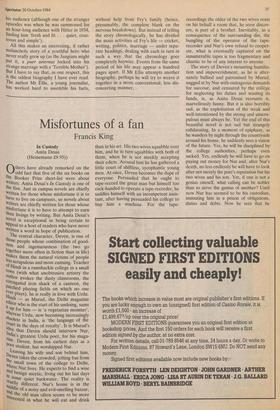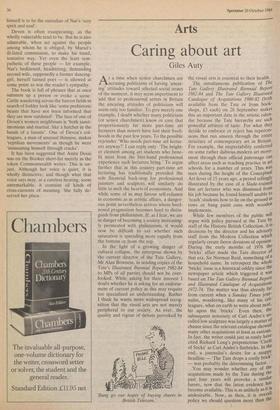Misfortunes of a fan
Francis King
In Custody Anita Desai (Heinemann £9.95))
Others have already remarked on the odd fact that five of the six books on the Booker Prize short-list were about Writers. Anita Desai's In Custody is one of the five. Just as campus novels are chiefly Written for those whose misfortune it is to have to live on campuses, so novels about writers are chiefly written for those whose Misfortune it is to have to attempt to earn their livings by writing. But Anita Desai's novel is exceptional in being certain to ePpeal to a host of readers who have never written a word in hope of publication. The central character, Deven, is one of th°se people whose combination of good- ness and ingenuousness (the two go together more often in fiction than in life) Makes them the natural victims of people less scrupulous and more cunning. Teacher °f Hindi in a ramshackle college in a small tOwIt (with what unobtrusive artistry the author evokes the dusty classrooms, the corrugated iron shack of a canteen, the Parched playing fields on which no one Hi ev.er plays), he is really in love with Urdu. ndi — as Murad, the Delhi magazine editor who is the start of his undoing, sums it uP for him — is 'a vegetarian monster', Whereas Urdu, now becoming increasingly °hsolete in India, is 'the language of the court in the days of royalty'. It is Murad's Idea that Deven should interview Nur, India's greatest Urdu poet, for his maga- zine. Deven, from his earliest days as a Poor student, has worshipped Nur. Leaving his wife and son behind him, Deven takes the crowded, jolting bus from he small town of the college to Delhi, Where Nur lives. He expects to find a wise and benign ascetic, living out his last days in some quiet backwater. The reality is cruelly different. Nur's house is in the middle of a noisy and evil-smelling bazaar, and the old man often seems to be more interested in what he will eat and drink than in his art. His two wives squabble over him, and he in turn squabbles with both of them, when he is not meekly accepting their edicts. Around hini he has gathered a little court of shiftless, sycophantic young men. At once, Deven becomes the dupe of everyone. Persuaded that he ought to tape-record the great man but himself too cack-handed to operate a tape-recorder, he saddles himself with an incompetent assis- tant, after having persuaded his college to buy him a machine. For the tape- recordings the older of the two wives rents on his behalf a room that, he soon discov- ers, is part of a brothel. Inevitably, as a consequence of the surrounding din, the bungling of the operator of the tape- recorder and Nur's own refusal to cooper- ate, what is eventually captured on the innumerable tapes is too fragmentary and chaotic to be of any interest to anyone.
The story of Deven's mounting humilia- tion and impoverishment, as he is alter- nately bullied and patronised by Murad, nagged at by Nur with outrageous demands for succour, and censured by the college for neglecting his duties and wasting its funds, is, as Anita Desai recounts it, marvellously funny. But it is also horribly sad, as the exploitation of the weak and well-intentioned by the strong and unscru- pulous must always be. Yet the end of this beautiful novel is not sad but strangely exhilarating. In a moment of epiphany, as he wanders by night through the countryside around his home, he suddenly sees a vision of the future. Yes, he will be disciplined by• the college authorities, perhaps even sacked. Yes, endlessly he will have to go on paying out money for Nur and, after Nur's death, no less endlessly he will have to look after not merely the poet's reputation but his two wives and his son. Yet, if one is not a genius oneself, what calling can be nobler than to serve the genius of another? Until now Nur has seemed to be his custodian, immuring him in a prison of obligations, duties and debts. Now he sees that he
himself is to be the custodian of Nur's 'very spirit and soul'.
Deven is often exasperating, as the wholly vulnerable tend to be. But he is also admirable, when set against the people among whom he is obliged, by Murad's ill-fated commission, to make his timid, tentative way. Yet even the least sym- pathetic of these people — for example, Nur's bedizened, headstrong, demanding second wife, supposedly a former dancing- girl, herself turned poet — is allowed at some point to win the reader's sympathy.
The book is full of phrases that at once summon up a person or evoke a scene. Cattle wandering across the barren fields in search of fodder look like 'some prehistoric beasts that have not been informed that they are now outdated'. The face of one of Deven's women neighbours is 'both sanct- imonious and martial, like a hatchet in the hands of a fanatic'. One of Deven's col- leagues, a man of unusual thinness, makes 'reptilian movements' as though he were 'insinuating himself through cracks'.
It has been suggested that Anita Desai was on the Booker short-list merely as the token Commonwealth writer. This is un- just. Although her voice is quiet, it is wholly distinctive; and though what that voice says may, at a careless hearing, seem unremarkable, it contains all kinds of cross-currents of meaning. She fully de- served her place.



















































 Previous page
Previous page